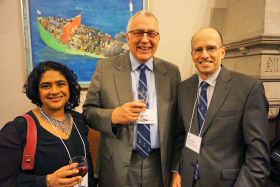Secondary menu
The challenges of the International Criminal Court

(From left) International Human Rights Program
director Renu Mandhane with ICC deputy prosecutor
James Stewart and law dean Ed Iacobucci
By Drew Beesley / Photo by Kathleen Davis
Demonstrating candour, a sharp intellect and humility, alumnus James Stewart, LLB 1975, deputy prosecutor of the International Criminal Court, dove right into a conversation addressing the challenges facing the world’s first permanent court of its kind.
A sold-out crowd filled the venue to hear Stewart and Richard Dicker, director of the international justice program at Human Rights Watch, with moderator Rita Maxwell, JD 2001, a local prosecutor and former ICC visiting professional. The Jan. 29th event was hosted by the Faculty of Law’s International Human Rights Program, Munk School of Global Affairs, and Human Rights Watch (HRW). The audience included notable figures such as John Ralston Saul, Bob Rae, and two of Canada’s advisers during the drafting of the Rome Statute, Darryl Robison and Valerie Oosterveld.
On the lack of state cooperation in finding and arresting those facing indictment, Stewart admitted that there is always room for improvement. He spoke of the uniqueness and challenges of each situation before the court (from Koni to Kenyatta), while pointing to efforts to enhance strategic planning between States parties. Most of all, he encouraged patience and reminded us that the Court is a relatively new institution still in its early days. Dicker echoed Stewart’s comments and said NGOs and governments have a stronger role to play in encouraging support for the ICC.
On the role of the United Nations Security Council, Stewart spoke of the need for follow-up after situations are referred to the ICC. Dicker was more blunt. He called the Security Council’s silence after the referral of Libya and the fall of Gaddafi “shameful.” Dicker cited a need to increase the political cost associated with a lack of support.
When asked if there was any feasible means of the ICC establishing an independent police force to get around the problem of relying on state cooperation for investigations and arrests, both speakers said the Rome Statute is clear that a police force is not in the cards. However, Dicker suggested a more prominent role for United Nations peacekeepers should be explored.
It is not African victims that are complaining of our presence in the region.
Stewart and Dicker spoke of the difficulty in addressing allegations of victor’s justice. Often the international media is quick to criticize when the ICC indicts only members from one side of a conflict. They agreed patience and a better understanding of how ICC investigations unfold would dispel many of these criticisms. For instance, the other side of a conflict is often simultaneously investigated. However, there are good reasons to keep investigations and indictments secret due to political sensitivities. Revealing an investigation too soon can prematurely jeopardize critical state assistance.
Stewart and Dicker highlighted the lack of understanding about the Court’s jurisdictional restraints to dispel criticism that the ICC is picking on Africa.
“It is not African victims that are complaining of our presence in the region,” said Stewart, noting they deserve justice when their local court and institutions cannot provide it.
On the concern that prosecutions often stymie or derail the peace process, both speakers agreed the purported contradiction is often greatly exaggerated. Dicker gave the example of the “doomsday” scenario predicted after indicting Sudan’s President, Omar Al-Bashir, on the North-South peace process. What transpired was far from it. In Stewart’s experience, if feelings of injury on the part of victims are unaddressed through justice, they fester. This can undermine the peace process in the long run, with renewed cycles of violence.
The pair faced questions on whether ICC prosecutions are actually having a deterrent effect on other would-be perpetrators. Stewart, a seasoned Canadian prosecutor before his international career, said the deterrent effect is very difficult to measure even in domestic criminal law. Dicker sees deterrence as an aspirational goal of the ICC but cautioned against its overemphasis. Both speakers cited encouraging anecdotes from Syria and the Central African Republic where people are starting to take note of the ICC and invoke its profile to those who may be considering committing atrocities. Dicker mentioned signs held by Syrian protesters that read: “Assad to the Hague.”
Of course, the elephant in the room was the ICC’s opening of a preliminary investigation this January into last summer’s Israeli-Palestinian conflict. Dicker predicts the Prosecutor’s Office is facing a highly divisive and politicized “tsunami.” Stewart said in some ways, it feels like the Office of the Prosecutor is in the eye of a storm. He stressed his office will approach the preliminary investigation like any other: with objectivity, impartiality, and independence. Stewart lamented this message, and that an understanding of the investigatory process sometimes gets lots amidst the rhetoric swirling around the Court. He reminded us that States are not indicted before the ICC, but rather individuals.
Still, in the end, Stewart and Dicker celebrated the ICC’s achievements in advancing the international justice project.
